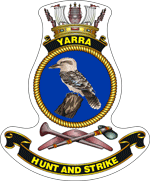 HMAS Yarra
| |
| History | |
|---|---|
| Namesake | The Yarra River |
| Builder | Cockatoo Island Dockyard |
| Laid down | 24 May 1934 |
| Launched | 28 March 1935 |
| Commissioned | 19 December 1935 |
| Motto | "Hunt and Strike" |
| Honours and awards |
|
| Fate | Sunk by Japanese cruisers, 4 March 1942 |
| Badge |  |
| General characteristics | |
| Class and type | Grimsby-class sloop |
| Displacement | 1,060 tons (standard), 1,500 tons (full load) |
| Length | 266 ft 3 in (81.15 m) |
| Beam | 36 ft (11 m) |
| Draught | 7.5 to 10 ft (2.3 to 3.0 m) |
| Propulsion | 2 × Admiralty 3-drum boilers, Parsons turbines, 2,000 shp (1,500 kW), 2 shafts |
| Speed | 16.5 knots (30.6 km/h; 19.0 mph) |
| Complement | 135 peace, 160 war |
| Armament | 3 × QF 4-inch (101.6 mm) Mk V anti-aircraft guns |
HMAS Yarra (U77), named for the Yarra River, was a Grimsby-class sloop of the Royal Australian Navy (RAN) that served during World War II. Commissioned in 1936, Yarra spent the early part of the war in Australian waters, then was transferred to the East Indies Station in 1940. The sloop operated in the Red Sea, then was involved in the Anglo-Iraqi War and the Anglo-Soviet invasion of Iran. After operating as part of the Tobruk Ferry Service in the Mediterranean during November, Yarra was reassigned to Southeast Asia in response to Japanese attacks. On 4 March 1942, Yarra was attacked and sunk by a force of Japanese cruisers and destroyers while attempting to protect ships withdrawing to Australia.